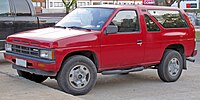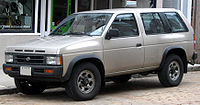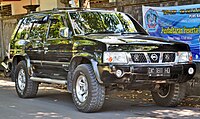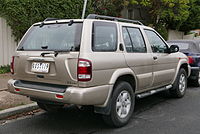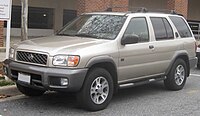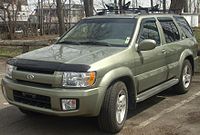Nissan Pathfinder
| Nissan Pathfinder | |
|---|---|
 2022 Nissan Pathfinder SV (front) | |
| Overview | |
| Manufacturer | Nissan |
| Production | 1986–present |
| Model years | 1987–2020 2022–present |
| Body and chassis | |
| Layout |
|
| Chassis |
|
| Chronology | |
| Predecessor |
|
| Successor |
|
The Nissan Pathfinder is a range of sport utility vehicles manufactured by Nissan since 1986. Until the third-generation model, the Pathfinder is based on Nissan's compact pickup truck platform which it shares with the Navara/Frontier.
The Pathfinder was marketed as the Nissan Terrano (Japanese: 日産・テラノ, Hepburn: Nissan Terano) outside North America. Beginning in 2004, the R51 series was marketed internationally as the Pathfinder.
In 2012, the R52 series Pathfinder was released as a three-row crossover SUV based on the unibody Nissan D platform, moving away from the body-on-frame chassis format. The role of a mid-size body-on-frame SUV in Nissan's global lineup was passed to the Terra/X-Terra, which was released in 2018 and based on the D23 series Navara.
First generation (YD21/WD21; 1986)
[edit]| First generation | |
|---|---|
 | |
| Overview | |
| Model code |
|
| Also called |
|
| Production |
|
| Model years | 1987–1995 |
| Assembly |
|
| Designer | Doug Wilson Jerry Hirshberg (1982, 1983)[3] |
| Body and chassis | |
| Body style | |
| Layout | |
| Platform | WD21 |
| Chassis | Body-on-frame |
| Related | Nissan D21 Pickup |
| Powertrain | |
| Engine | |
| Transmission | |
| Dimensions | |
| Wheelbase | 2,650 mm (104.3 in) |
| Length |
|
| Width |
|
| Height |
|
The first generation Pathfinder was unveiled in December 1985 and was later introduced in May 1986 as a two-door body-on-frame SUV, for the 1987 model year in the United States. It shared styling and most components with the Nissan Hardbody Truck. Built on a ladder-type frame, the Pathfinder was Nissan's response to the Chevrolet Blazer, Ford Bronco II, Jeep Cherokee, and non-American SUVs like the Toyota 4Runner, Honda Passport, and the Isuzu MU.
Before the Pathfinder there was the Nissan Bushmaster (an aftermarket conversion of the Datsun Truck). Its optional 4WD system that could be engaged electronically while the vehicle was moving was unique at the time. All YD21 Pathfinders were available in both 2WD and manually engaged 4WD configurations, with base models installed with a 2.4 L four-cylinder engine. In certain countries, this generation also came with a 2.7-liter I4 diesel engine known as the TD27 with the option of a turbocharger installed later in November 1988.
In Japan, it was exclusive to Nissan Shop locations, where it was called the Terrano and served as a smaller companion to the larger Nissan Safari. While the Pathfinder/Terrano was essentially based on the newly introduced Hardbody truck, the rear five-link coil suspension was borrowed from the Safari to enhance its off-road abilities. In addition to the Station Wagon version (two or late four doors), the home market also received a version intended for commercial use called the "Estate Van" (chassis codes beginning with the letter "V"). The two-door version was available with the Nissan VG30i V6, which produces 140 PS (103 kW) at 4800 rpm in Japanese market specifications.
As the Japanese market Terrano was regarded as a luxury vehicle, with an emphasis on outdoor leisure activities, the Terrano was introduced to Japanese buyers as an off-road, back-country Fairlady ZX.[citation needed] To emphasize this marketing approach, the Terrano was available with options not normally found on other budget-minded vehicles. Some of the upmarket Japanese-model options were climate-controlled air conditioning, electrically powered windows, seats, door locks, and, in 1993, Recaro seats. Nissan's sports division Autech added special equipment packages, introducing the "Wide R3M Urban" and the "AJ Limited". The "Wide" models used overfenders and larger bumpers which made their exterior dimensions exceed dimension regulations, thus incurring a higher annual road tax obligation. The Wide models were given the leading letter "L" in their model codes. The emphasis on luxury was partly due to a strong economy in Japan, in what is now regarded as the Japanese "bubble economy".
In 1985, the first generation Terrano was entered in the ninth Paris to Dakar rally race, with continued entries in rally races for many years, winning multiple times in its category.
The four-door Pathfinder was introduced in October 1989 to enhance the Pathfinder's market appeal, but the wheelbase and overall vehicle length were not extended to accommodate the rear doors. At its introduction to North America, 1985 to 1989 Pathfinders all came with a two-door body. For 1990 it became four door-only, although a small number of US 1990 Pathfinders came with the two-door body.[citation needed]
When the four-door version was introduced, Nissan chose to conceal the door handles as a part of the "C" pillar trim to make it appear like a two-door truck with a camper shell, with the conventional door handles on the front doors. This design tradition was used on all Nissan SUVs, including the Nissan Armada, Nissan Juke, Nissan Terrano II, and the Nissan Xterra. The front doors were slightly shortened to accommodate the rear doors.
From 1987 to 1989 Pathfinders were available with either the Nissan VG30i 3.0 L V6 (143 hp (107 kW), 162 lb⋅ft (220 N⋅m) torque), or the Nissan Z24i 2.4 L (106 hp (79 kW)) I4 (the same engine choices as the Nissan Hardbody Truck). For 1990, the V6 received an upgrade from throttle body injection to a multi point fuel injection system. This engine was known as the VG30E, and was rated at 153 hp (114 kW) and 180 lb⋅ft (244 N⋅m) torque. Also in 1990, the Z24i was replaced with the KA24E. The first generation continued until 1995.
The first generation Nissan Pathfinder also sold in Indonesia from 1995 to 2006 as Nissan Terrano. Only available with four-door body, 2389 cc Z24 carburetted petrol engine (103 hp & 182Nm), 2WD (4WD only available for 1995-1996 highest trim model[4]) and 5-speed manual transmission. Only 17,801 units were sold during 11 years of production.[5]
Facelifts
[edit]A facelift occurred in 1990 when the 4-door model was introduced. The front grille was revised, numerous interior trim level options became available and numerous exterior packages were offered by dealerships. The 1993 models received a third brake light and the 1994 models received a curved dashboard. Two more facelifts occurred for Indonesian production Terrano in 1997 and 2003.
-
1987–1990 Nissan Pathfinder 2-door
-
1986–1995 Nissan Pathfinder 4-door
-
1990–1995 Nissan Pathfinder 4-door
-
Nissan Terrano D21
-
Nissan Terrano Freeway
-
1996–2003 Nissan Terrano Kingsroad (Indonesia)
-
2003–2006 Nissan Terrano Spirit S3 (front, Indonesia)
-
Nissan Terrano Spirit S3 with new crystal rear lights (rear, Indonesia)
Second generation (R50; 1995)
[edit]| Second generation | |
|---|---|
 | |
| Overview | |
| Model code | R50 |
| Also called | Nissan Terrano Infiniti QX4 |
| Production | October 1995 – August 2004 |
| Model years | 1996–2004 |
| Assembly |
|
| Designer | Jerry Hirshberg Yoshio Maezawa (1992, facelift: 1997) |
| Body and chassis | |
| Body style | 5-door SUV |
| Layout | |
| Chassis | Unibody |
| Powertrain | |
| Engine | |
| Transmission |
|
| Dimensions | |
| Wheelbase | 2,700 mm (106.3 in) |
| Length |
|
| Width |
|
| Height |
|
The second generation Pathfinder was introduced in late 1995 with revised styling. The engine was upgraded to the VG33E, with 168 hp (125 kW) and 196 lb⋅ft (266 N⋅m) torque. For the 19991⁄2 model year, the Pathfinder was freshened. In 2000, model year 2001 brought a new 240 hp (179 kW) V6 engine (for the automatic transmission models). The manual transmission models boasted 250 hp (186 kW) and 240-lbft of torque. This engine was the VQ35DE. The 4-cylinder engine option was no longer available, and diesel engines continued to be used in Japanese and European models.
As of the 2002 model year, the Terrano / Pathfinder was no longer marketed in Japan, and was available in North America, Europe and the Middle East. The market position held by the Terrano in Japan was replaced by the Nissan Murano in 2002. The Japanese market Terrano and high luxury content Terrano Regulus saw demand drop significantly due to the hard economic times felt in Japan, known as the Lost Decade. Nissan offered a smaller, off-road vehicle to its Japanese customer base who enjoyed the Pathfinder when it introduced the Nissan X-Trail in 2000.
-
Nissan Terrano StarFire
-
1997 Nissan Pathfinder RX (Australia)
Facelifts
[edit]The Pathfinder received a facelift for the 1999.5 model year with a revised front fascia, rear fascia, and interior — followed by another facelift occurred in 2002, receiving the updated Nissan logo, a revised grille, as well as a new steering wheel, different rims and radio display. In 2003, the Pathfinder again received a new steering wheel.
-
1999–2001 Nissan Pathfinder
-
2001 Nissan Pathfinder Ti (Australia)
-
1999–2001 Nissan Pathfinder SE
-
2001–2004 Nissan Pathfinder
Infiniti QX4/Terrano Regulus
[edit]| Infiniti QX4 | |
|---|---|
 1997–2000 Infiniti QX4 (pre-facelift) | |
| Overview | |
| Manufacturer | Nissan |
| Also called | Nissan Terrano Regulus (Japan) |
| Production | September 1996 – November 2002 |
| Model years | 1997–2003 |
| Assembly | Japan: Kanda, Fukuoka (Nissan Shatai) |
| Body and chassis | |
| Class | Mid-size luxury SUV |
| Body style | 5-door SUV |
| Layout | |
| Chassis | Unibody |
| Powertrain | |
| Engine | |
| Chronology | |
| Successor | Infiniti QX56 Infiniti FX Infiniti JX |
The Infiniti QX4 is a mid-size luxury SUV introduced in September 1996 and based on the Nissan Pathfinder. It was released following Acura's introduction of the SLX and Lexus's larger LX 450. The QX4 was Infiniti's first entry into the SUV market segment.
It was available in Japan as the Nissan Terrano Regulus and exclusive at Nissan's JDM Nissan Store. Major differences between these vehicles and the regular Pathfinder/Terrano include a more upscale interior and unique styling. Marketed as a luxury vehicle, The Terrano Regulus offered off-road capability with a low-range four-wheel-drive system and 8.3 inches (211 mm) of ground clearance. In Japan, two four-cylinder diesel engines were also available. The US-market engine was the same 3.3-liter V6 unit as used in the Pathfinder, producing 168 hp (125 kW) at 4,800 rpm and 196 lb⋅ft (266 N⋅m) at 4,800 rpm. This was generally considered underpowered for the segment, with a 0–60 mph (97 km/h) time of 12.4 seconds in period testing.[6] In 1999, the Terrano was exclusive to reorganized Nissan JDM Nissan Blue Stage dealerships.
Year-to-year changes
[edit]The Terrano Regulus was updated in February 1999. The interior design was revised, while the old QD32ETi overhead valve turbodiesel was replaced with the new DOHC, 16-valve ZD30DDTi unit. The VG33E engine continued unchanged, but with the added option of two-wheel-drive.
The QX4 received its first major update in March 2000, as an early introduction for model year 2001. The biggest change was the new VQ series V6 engine (also later seen in the G35 and FX35), increasing its power from a relatively low 168 to 240 hp (125 to 179 kW).[6] The displacement went from 3.3 L to 3.5 L. The timing belt was replaced with a timing chain and the ignition distributor was replaced with an individual coil ignition system. The revised version was introduced at the same price as the earlier model, in spite of the extra power and other improvements.[7]
This facelift also gave the QX4 an updated exterior and interior body style, including a new grille and bumpers, reworked Xenon HID headlamps and redesigned taillights, a new dash with integrated analog clock, and 17-inch alloy wheels.[7] Also, a rear-wheel drive QX4 model was added (1997 through 2000 were only available in 4WD).
The Terrano Regulus continued to use the VG33E engine (and the 3-liter turbodiesel inline-four), although the short-lived V6 2WD option was discontinued again in September 2001, along with some minor changes.
2002 Infiniti QX: Cruise control designed to maintain a set distance from other traffic was the main addition for 2002. The QX4 shared Nissan's Intelligent Cruise Control with Infiniti's flagship Q45 sedan. Employing laser sensors, the system was designed to automatically speed or slow the QX4 to keep it a constant distance from cars ahead. Also new for 2002 was a revised audio system, plus audio controls for the available leather/wood steering wheel. The optional rear-seat video entertainment system offered a choice of VCR or DVD player. The Japanese-market Terrano Regulus was discontinued in August 2002.
2003 Infiniti QX: Additional standard equipment for 2003 included curtain-type side airbags, available for the first time. New standard equipment that had previously been part of the Premium Package included 17-inch wheels, a driver-seat memory system, and a leather/woodgrain steering wheel with audio controls. Options included heated front/rear seats and a videotape or DVD rear-seat entertainment system. A power moonroof that came standard.
The QX4 was discontinued in 2003, and its position in price was taken by the FX35/45 crossover SUV. The last QX4 was manufactured during November 2002.[citation needed] The QX4 was succeeded by the larger QX56 in 2004.
-
The facelifted QX4 (2001–2003)
-
QX4 rear view (facelift model)
-
2001 Nissan Terrano Regulus (JDM)
-
Nissan Terrano Regulus Starfire (JDM), fitted with a full Nismo bodykit
Third generation (R51; 2004)
[edit]| Third generation | |
|---|---|
 2005–2007 Nissan Pathfinder (pre-facelift) | |
| Overview | |
| Model code | R51 |
| Production | August 2004 – 2014 |
| Model years | 2005–2012 (North America) |
| Assembly |
|
| Designer | Kiyoshi Yanase (2002)[8] |
| Body and chassis | |
| Body style | 5-door SUV |
| Layout | |
| Platform | Nissan F-Alpha platform |
| Chassis | Body-on-frame |
| Related | |
| Powertrain | |
| Engine | |
| Transmission |
|
| Dimensions | |
| Wheelbase | 2,850 mm (112.2 in) |
| Length | 4,765–4,890 mm (187.6–192.5 in) |
| Width | 1,849 mm (72.8 in) |
| Height | 1,839–1,862 mm (72.4–73.3 in) |
| Chronology | |
| Successor | Nissan Terra (as a body-on-frame SUV) |
In August 2003, Nissan unveiled Dunehawk Concept and showcased it at the IAA 2003 in Frankfurt (R51 design patents filed 8 September 2003), previewing the next Pathfinder's design. At the 2004 North American International Auto Show, Nissan unveiled a completely redesigned Pathfinder for the 2005 model year. The new R51 Pathfinder uses the Nissan F-Alpha platform. It is powered by a 4.0 L V6 engine VQ40DE (266 hp (198 kW), 288 lb⋅ft (390 N⋅m)) or a 2.5 L YD25DDT (126 kW (171 PS; 169 hp), 403 N⋅m (297 lb⋅ft)) turbodiesel.[9]
The larger Pathfinder Armada debuted in late 2003, but was based on the Titan full-sized pickup truck and dropped the "Pathfinder" prefix in 2005.
The 2005 model introduced a third row of seats to the Pathfinder line for the first time.
2008 facelift (US and Middle East)
[edit]The facelifted 2008 Pathfinder debuted at the 2007 Chicago Auto Show. Some of the badge positions on the rear liftgate were tweaked, and this version also received the Titan's 5.6-liter V8 engine rated at 310 hp (231 kW) and 388 lb⋅ft (526 N⋅m).
2010 facelift (Europe, South America, Asia/Oceania, Caribbean)
[edit]An updated version debuted at the Geneva Motor Show in 2010, now available with the Nissan V9X Engine 3.0-litre V6 turbodiesel producing 170 kW (231 PS; 228 hp) and 550 N⋅m (406 lb⋅ft) at 1,750 – 2,500 rpm while the upgraded YD25DDTi turbodiesel also available produces 140 kW (190 PS; 188 hp) – up 14 kW (19 PS; 19 hp) – while torque increased by 47 N⋅m (35 lb⋅ft) to 450 N⋅m (332 lb⋅ft).[10] Over the combined cycle manual versions use 8.4 L/100 km – an improvement of 1.4 L/100 km – while CO2 emissions have fallen by 40g/km to 224 g/km. Both figures were class competitive at the time. A version of the engine with a diesel particulate filter (DPF) was also available in certain markets.
The R51 series Pathfinder continues to be sold and produced outside North America.
Exterior changes
[edit]The revised models have been given a new look front and rear to differentiate them from their predecessors. Changes at the front include a new bonnet, revised grille and a new bumper assembly. Adding 80 mm to the length of both models, the bumper is more rounded and lends a more sporting touch to the cars.
A new headlamp design with projectors is offered for Xenon lamps. Headlamps washers now pop up from beneath body color moulding in the bumpers. A new 18-inch (460 mm) alloy wheel complements the existing range of 16-inch (steel and alloy) and 17-inch (alloy) designs. V8 models are given a discreet V8 badge at the leading edge of both front doors and a new side moulding across the doors.
-
2005–2007 Nissan Pathfinder ST-L (pre-facelift, Australia)
-
2008 Nissan Pathfinder V8 (facelift, US)
-
2013 Nissan Pathfinder SE (facelift)
-
Interior
Fourth generation (R52; 2012)
[edit]| Fourth generation | |
|---|---|
 Nissan Pathfinder Ti 4WD (Australia) | |
| Overview | |
| Model code | R52 |
| Production | September 2012 – June 2020 (US) |
| Model years | 2013–2020 |
| Assembly | United States: Smyrna, Tennessee (Nissan Smyrna Assembly Plant) Russia: Saint Petersburg (2014–2016) |
| Designer | Alfonso Albaisa (2010)[11] |
| Body and chassis | |
| Body style | 5-door SUV |
| Layout | |
| Platform | Nissan D platform |
| Chassis | Unibody |
| Related | Infiniti JX/QX60 (L50) |
| Powertrain | |
| Engine | |
| Transmission | Jatco Xtronic CVT |
| Dimensions | |
| Wheelbase | 2,900 mm (114.2 in) |
| Length | 5,042 mm (198.5 in) |
| Width | 1,963 mm (77.3 in) |
| Height | 1,766 mm (69.5 in) |
A redesigned Pathfinder went on sale in late October 2012 as a 2013 model. It moved away from a body-on-frame, truck-based SUV and adopted a unibody design. It rides on the same platform as the Infiniti QX60, Altima, Maxima, Murano and Quest. This generation Pathfinder has an interior similar to the second generation Murano, the Infiniti QX60, and some more SUVs and sedans. The third row has more leg room than the Nissan Rogue.
A concept, nearly identical to the eventual production model, was first revealed at the 2012 North American International Auto Show. Retail availability was scheduled for September 2012. The new Pathfinder is only available with a VQ35DE 3.5-liter V6 engine producing 260 hp (194 kW) and 240 lb⋅ft (325 N⋅m) of torque. City, highway and combined average fuel economy numbers are 20 (City), 26 (Highway) and 22 (Combined) mpg for the FWD version and 19 (City), 25 (Highway) and 21 (Combined) mpg for the 4WD version. The Pathfinder is now significantly lighter than the previous generation, with the FWD model weighing 4149 pounds, while the 4WD Pathfinder weighs 4290 pounds.
This generation also abandons having the rear door handles hidden on the C pillar, a design feature of the first three generations of Pathfinders. As of 2015, the R52 series is only available in North America, Africa, Australia, New Zealand, South Korea, and the Middle East. It is not produced or sold in Japan.
-
Rear view
-
Interior
2014 model year update
[edit]Changes to the US 2014 model include:[14][15][16]
- New SL Tech Package, featuring Bose Premium Audio System, Nissan Navigation System, voice recognition, XM NavTraffic and NavWeather capability (SiriusXM subscription required, sold separately), Zagat Restaurant Survey, Bluetooth Streaming Audio and 8.0-inch color touchscreen monitor
- Offered in four models: S, SV, SL and Platinum (each available in 4WD and 2WD); Pathfinder Hybrid offered in SV, SL and Platinum (4WD and 2WD)[17]
- 3.5-liter V6 models available late summer 2013
- Pathfinder Hybrid available fall 2013
- Pathfinder utilizes a Continuously Variable Transmission (CVT) transmission made by Jatco; early versions of this CVT have proved to be problematic to the point of requiring replacement by Nissan in some 2013 and 2014 model years due to a hydraulic line size issue.
Canadian models of 2014 Pathfinder includes Pathfinder 3.5-litre 4WD V6 X, Pathfinder V6 S; 2014 Pathfinder Hybrid includes SV and Platinum Premium.[18]
A locally built Pathfinder entered the Russian market in November 2014.[19]
Pathfinder Hybrid
[edit]Introduced for model year 2014, the Pathfinder Hybrid, available in two-wheel drive and four-wheel drive configurations, uses a supercharged 2.5-liter four-cylinder gasoline engine and an electric motor paired to a compact lithium-ion battery. The Li-ion battery fits under the third row seat, with no effect on space used for cargo or passengers. The Pathfinder Hybrid also has hybrid emblems and hybrid LED taillights versus the non-hybrid model.
Nissan discontinued the Pathfinder Hybrid after the 2014 model year due to owner reviews and complaints that they could not get gas milage that was anywhere close to the advertised 25 to 28 mpg and limited availability and poor sales in the United States (discontinued after the 2015 model year in Canada and in other global markets except Australia and New Zealand).[citation needed]
2017 facelift
[edit]For model year 2017, the Nissan Pathfinder received an exterior update which includes a new fascia with restyled headlights and tail lights and a new direct-injected V6 engine with CVT—outputting 284 hp (212 kW) and 259 lb⋅ft (351 N⋅m). The headlights had LED projector low beam headlamps and LED daytime running lights standard on Platinum trim levels, while S, SV and SL trim levels offer restyled halogen projector headlights with LED daytime running lights. Restyled tail lights will be standard on Platinum trim levels, and all 2017 Pathfinders will also have new exterior colors added. The interior also has redesigned cup holders. A Motion Activated Liftgate is also now standard on SL and Platinum trim levels only as part of the power liftgate. The 2017 model year is also its 30th anniversary for the Nissan Pathfinder but there won't be any 30th anniversary special edition model for the 2017 Pathfinder. But the Nissan Pathfinder will have a Midnight Edition trim level which will be higher than the Platinum trim level for its base MSRP and arrive in early 2017 and the Nissan Altima, Sentra, Murano, Maxima and Rogue will also add the Midnight Edition trim level to their trim lineups in early 2017.
-
Nissan Pathfinder ST (2017 facelift; Australia)
-
Rear view
-
Interior
2019 update
[edit]The Rock Creek Edition package is introduced to the Nissan Pathfinder for the 2019 model year. The appearance package is only available on the SV and SL trim levels. The package adds 18" X 7.5" dark-finished aluminum alloy wheels, black overfenders and black door handles, Rock Creek Edition badging, leatherette-appointed seating with cloth inserts and Rock Creek Edition badging (SV trim level), leather appointed seating with Rock Creek Edition badging (SL trim level), and premium Rock Creek Edition interior trim.[20] It was manufactured until June 2020.[21]
-
2019 Nissan Pathfinder SL Rock Creek (front view; US)
-
2019 Nissan Pathfinder SL Rock Creek (rear view; US)
Fifth generation (R53; 2021)
[edit]| Fifth generation | |
|---|---|
 2023 Nissan Pathfinder SL (US) | |
| Overview | |
| Model code | R53 |
| Production | May 2021 – present[22] |
| Model years | 2022–present |
| Assembly | United States: Smyrna, Tennessee (Nissan Smyrna Assembly Plant) China: (Dongfeng Nissan) |
| Designer | Ken Lee[23] (2017) |
| Body and chassis | |
| Body style | 5-door SUV |
| Layout | |
| Platform | Nissan D platform |
| Chassis | Unibody |
| Related | Infiniti QX60 (L51) |
| Powertrain | |
| Engine | |
| Transmission | 9-speed ZF 9HP automatic |
| Dimensions | |
| Wheelbase | 2,900 mm (114.2 in) |
| Length | 5,021 mm (197.7 in) |
| Width | 1,979 mm (77.9 in) |
| Height | 1,801 mm (70.9 in) |
International Version
[edit]The fifth-generation Pathfinder was unveiled on 4 February 2021, scheduled for a summer 2021 debut as a 2022 model while the 2021 model year was entirely skipped.[24] The model remains a unibody crossover, riding on the same platform as the previous generation, though it gains a more squared-off look with styling cues from previous Pathfinders along with the Rogue and Armada. Its dimensions are 1.5 in (3.8 cm) longer, 0.6 in (1.5 cm) wider, and 0.5 in (1.3 cm) taller. Engine power remains the same, at 284 hp (212 kW; 288 PS) and 259 lb⋅ft (351 N⋅m) of torque, though the CVT is replaced with an all-new 9-speed automatic from ZF. The fifth-generation Pathfinder also receives a new terrain-management system, dubbed Intelligent 4x4, featuring 7 management settings. Trailer sway control is also included as standard, in addition to Safety Shield 360, Nissan's active safety suite.
The interior also receives a redesign, featuring a squared-off, trucklike appearance mirroring the overall theme set by the exterior. The new interior also gains the "floating bridge" and electronic shifter seen in the smaller Rogue. An 8-inch touchscreen infotainment with Apple CarPlay and Android Auto is standard, while upper trims use a 9.0-inch unit, with wireless Apple CarPlay capability. The top-spec Platinum model gains a 12.3-inch digital gauge cluster and a 10.8-inch heads-up display in addition to the 9.0-inch screen.[25][26][27] The fifth-generation Pathfinder comes standard as an 8-seater, with second-row bucket seats, a first for the Pathfinder, are now on offer. The S and SV trim levels get cloth seat trim as standard, with leather-appointed seating standard on the SL trim level; the Platinum trim level gets quilted, semi-aniline leather-appointed seating.[28]
In 2022, for the 2023 model year, the new Rock Creek Edition is available with black wheels, and off-road suspension and a new Baja Storm exterior color is also available and the wireless smartphone charging pad is now standard on the SL grade while the Platinum trim level comes standard with second-row bucket seats.
-
Rear view
-
Interior
-
2023 Nissan Pathfinder Rock Creek (Canada)
Chinese Version
[edit]A concept version of the Pathfinder was unveiled at the 2023 Auto Shanghai show, visually different from the North American version.[29][30] The production model was released in November 2023 at the Auto Guangzhou. Based on the US-made Pathfinder, the Chinese market Pathfinder is powered by a 2.0-litre KR20DDET turbocharged engine.[31][32]
-
Nissan Pathfinder Concept (China)
-
Nissan Pathfinder Concept (China) Rear view
-
2023 Nissan Pathfinder (China) Front view
-
2023 Nissan Pathfinder (China) Rear view
-
2023 Nissan Pathfinder (China) Interior
Sales
[edit]| Calendar year | United States[33] | Canada[34] | Europe[35] |
|---|---|---|---|
| 2000 | 657 | ||
| 2001 | 581 | ||
| 2002 | 294 | ||
| 2003 | 145 | ||
| 2004 | 83 | ||
| 2005 | 76,149 | 4,101 | 16,156 |
| 2006 | 73,124 | 3,027 | 18,406 |
| 2007 | 63,056 | 1,944 | 14,701 |
| 2008 | 33,555 | 1,196 | 7,166 |
| 2009 | 18,341 | 8,15 | 3,663 |
| 2010 | 21,438 | 1,400 | 2,788 |
| 2011 | 25,935 | 1,880 | 4,274 |
| 2012 | 42,621 | 2,666 | 3,124 |
| 2013 | 88,632 | 7,936 | 1,868 |
| 2014 | 79,111 | 9,688 | 1,867 |
| 2015 | 82,041 | 9,898 | 388 |
| 2016 | 81,701 | 9,670 | 6 |
| 2017 | 81,065 | 9,839 | 3 |
| 2018 | 67,550 | 7,099 | 5 |
| 2019 | 65,691 | 5,704 | |
| 2020 | 48,579 | 3,392 | |
| 2021 | 41,324 | 3,243 | |
| 2022 | 57,862 | 4,776[36] | |
| 2023 | 71,710 | 6,773[37] |
References
[edit]- ^ Palmer, Zac (5 February 2021). "The topsy turvy history of the Nissan Pathfinder". Autoblog. Retrieved 21 April 2024.
- ^ "Nissan in Indonesia". Car-cat.com. Archived from the original on 6 August 2019. Retrieved 25 July 2010.
- ^ "Doug Wilson (TRAN, '69)". Archived from the original on 29 December 2015. Retrieved 15 July 2015.
- ^ "Nissan Terrano WD21". 3 July 2016.
- ^ "Sejarah Lengkap Nissan Terrano di Indonesia". jip.gridoto.com.
- ^ a b Raynal, Wes (24 April 2000). "2001 Infiniti QX4: More Power!". AutoWeek. Vol. 5, no. 18. Crain Communications Inc. p. 22.
- ^ a b Raynal (2000), p. 23.
- ^ "Archived copy" (PDF). Archived from the original (PDF) on 4 January 2014. Retrieved 3 June 2014.
{{cite web}}: CS1 maint: archived copy as title (link) - ^ "Patent USD499987 – Surface configuration of a vehicle body, toy, and/or replica". Retrieved 15 July 2015.
- ^ Leach, Brad (24 September 2010). "2010 Nissan Pathfinder TI Turbo Diesel - Car Review". CarShowroom. Archived from the original on 2 December 2016.
- ^ Logiurato, Brett (10 January 2012). "How Nissan Avoided the Pitfalls of Honda and Toyota, Kept Momentum in 2011". International Business Times. Retrieved 6 October 2016.
- ^ "Nissan Pathfinder Hybrid: Missing In Action, Or Just Slow-Selling?". Green Car Reports. 20 February 2015. Retrieved 15 June 2021.
- ^ "2017 Nissan Pathfinder Oil Type". Retrieved 15 January 2022.
- ^ "2014 Nissan Pathfinder Hybrid Offers 26 MPG Combined Fuel Economy and 526-Mile Driving Range – With No Compromise of Performance or Interior Roominess". Nissan Online Newsroom. 27 March 2013. Retrieved 15 July 2015.
- ^ NISSAN MOTOR Co., Ltd. (28 March 2013). "NISSAN – 2014 NISSAN PATHFINDER HYBRID OFFERS 26 MPG COMBINED FUEL ECONOMY AND 526-MILE DRIVING RANGE – WITH NO COMPROMISE OF PERFORMANCE OR INTERIOR ROOMINESS". Archived from the original on 3 March 2016. Retrieved 15 July 2015.
- ^ Ewing, Steven J. (27 March 2013). "2014 Nissan Pathfinder Hybrid arrives with supercharged engine, 26 mpg combined". Autoblog. Retrieved 15 July 2015.
- ^ Turkus, Brandon (26 October 2013). "2014 Nissan Pathfinder Hybrid priced from $35,110*". Autoblog. Retrieved 15 July 2015.
- ^ "2014 Nissan Pathfinder Hybrid Press Kit". Nissan Online Newsroom. 27 February 2013. Retrieved 15 July 2015.
- ^ "Nissan Pathfinder are on sale now". Wroom.ru. 31 October 2014. Archived from the original on 11 November 2014. Retrieved 11 November 2014.
- ^ "2022 Nissan Pathfinder | 8 Passenger SUV | Nissan USA".
- ^ "Nissan Pathfinder Platinum 4WD (cont. variable speed) as offered for the year 2020 up to June 2021 in North America". Automobile Catalog. Retrieved 12 February 2024.
- ^ "All-new 2022 Nissan Pathfinder rolls off assembly line". Automotive World. 13 May 2021. Retrieved 13 May 2021.
- ^ "10 questions with 2022 Nissan Pathfinder Senior Design Director Ken Lee". 4 February 2021.
- ^ Robert Duffer Senior (ed.). "Nissan Pathfinder skips 2021 model year in advance of 2022 redesign". The Car Connection. Retrieved 8 August 2021.
- ^ "2022 Nissan Pathfinder Press Kit". 3 September 2024.
- ^ "2022 Nissan Pathfinder Adds New Features and Ditches the CVT". 4 February 2021.
- ^ "2022 Nissan Pathfinder: Eight-seater SUV revealed - Drive".
- ^ ZumMallen, Ryan (1 April 2021). "2022 Nissan Pathfinder Prices, Reviews, and Pictures | Edmunds". Edmunds.com.
- ^ Pappas, Thanos (19 April 2023). "Nissan Pathfinder Concept Previews Seven-Seater SUV For China". Carscoops.
- ^ "2023 Nissan Pathfinder Concept Debuts At Auto Shanghai With China In Mind". Motor1.com. 19 April 2023.
- ^ "【图】2023广州车展探馆:东风日产Pathfinder_汽车之家" [2023 Guangzhou Auto Show Tour: Dongfeng Nissan Pathfinder]. www.autohome.com.cn. Retrieved 22 November 2023.
- ^ "【图】海狮07 EV等 广州车展将上市SUV(上)_汽车之家" [Hiace 07 EV and other SUVs to be launched at Guangzhou Auto Show (Part 1)]. www.autohome.com.cn. Retrieved 22 November 2023.
- ^ "Nissan Pathfinder US Sales Figures". GoodCarBadCar Automotive Sales Data.
- ^ "Nissan Pathfinder Canada Sales Figures". CarFigures. Retrieved 5 April 2024.
- ^ "Nissan Pathfinder Europe Sales Figures". GoodCarBadCar Automotive Sales Data.
- ^ "Nissan Group reports fourth-quarter 2022 and calendar year 2022 Canadian sales". Official Canada Newsroom. 4 January 2023. Retrieved 14 January 2023.
- ^ "Nissan Group Reports Fourth Quarter and Annual Sales for 2023". Official Canada Newsroom. 4 January 2024. Retrieved 14 January 2024.
External links
[edit]- Official website (US)
- Nissan vehicles
- Cars introduced in 1985
- 1990s cars
- 2000s cars
- 2010s cars
- 2020s cars
- Rear-wheel-drive vehicles
- Front-wheel-drive vehicles
- All-wheel-drive vehicles
- Compact sport utility vehicles
- Mid-size sport utility vehicles
- Crossover sport utility vehicles
- Hybrid electric vehicles
- Vehicles with CVT transmission
- Motor vehicles manufactured in the United States

